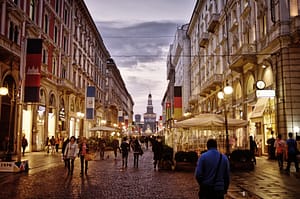The myth goes that the twins Romulus and Remus founded Rome in 753 BC, although the expansion of Rome and its Imperial beginnings really date back around 350 BC with the conquest of the Etruscans, a former Mediterranean power. The empire dominated all of Western Europe for over 800 years until its fall in 475 AD, after which Italy became a confusion of numerous city-states for most of the following millennium.
During the medieval period and the Middle Ages, Italy was a confusion of city states including the Papal State, with destabilizing internal conflict and invasions by various European raiders. Venice, Florence and Genoa became great powers, with their wealth spurring the magnificence of Renaissance artists to ever greater heights. The present day museums in Italy hold the majority of works by masters such as Leonardo, Michelangelo and Rafael, and their genius was employed in many famous architectural designs.
From the late 16th century, Italy was divided between European powers until 1796 when Napoleon’s army arrived in the north to break the stranglehold of the Austrians around Milan and Sardinia. The French were successful and Napoleonic Italy became a reality from 1800 to 1814. In 1815, the Pope excommunicated the French uprising, who was immediately arrested and sent back across the border after which the Austrians took over once more.
After centuries of unrest, the 19th century saw radicals committed to a united Italy, led by Garibaldi. In 1848, revolutionary riots broke out, followed by 18 months of violence and drama until 1859. There was a year-long war involving Napoleon III against Austrian attempts to regain their position of power. The final steps to unity came in 1860-1861 under King Victor Emmanuel I’s reign.
Between 1914 and 1918, WWI had little effect on the country, but WWII was a very different story due to the rise of the Fascist dictator Benito Mussolini, who dragged Italy into the conflict in 1940 in support of Nazi Germany. Italy became a theater of war when Allied forces arrived in Sicily and began making their way up the mainland in spite of fierce resistance from the German army. In 1943, Mussolini changed sides, signing an armistice with the Allies and was promptly imprisoned. He and his mistress were executed by Italian partisans in April 1945.
Post-war Italy sang to a different tune, that of rejection of fascism and acceptance of itself as a republic, which spurred an economic boom between 1950 and 1973. Industry flourished and energy and transportation infrastructure were put in place, although from 1970 to 1980 social conflict including terrorism threatened prosperity. The Second Republic, led in 2008 by Silvio Berlusconi, is now a center of controversy over its fragile economic status.
The rich culture of Italy formed the heart of the Western World from the days of Imperial Rome up to the end of the 16th century. The Roman Empire itself, the emergence of the Roman Catholic Church, the cultural flowering of the Renaissance era and the birth of Humanism all exerted strong influence across the globe. Nowadays, Italian culture is best represented in art, music, fashion and cuisine, all existing in harmony with great icons of the past, many of which are now UNESCO World Heritage sites.
Italy is home to more than 50% of the world’s art treasures, and the works of its great composers over the ages are still much-loved by the majority of locals. Music, whether classical or modern, is an integral part of life, unsurprisingly in a country which invented the musical stave, and the piano and opera have given birth to many of the world’s greatest composers, conductors and singers. In modern times, Italy is credited with developing progressive rock, italo-disco and experimental rock.
Theater performances have a long heritage here, based on the tradition of traveling players and their Canovaccio comedies. Specific regions have folk music traditions, for example, the famous Neapolitan dialect songs made famous in the early to mid 19th century by Enrico Caruso and Mario Lanza. Visitors to Naples will still hear ancient classics such as Torno al Suriento floating out from streetside bars and eateries.

